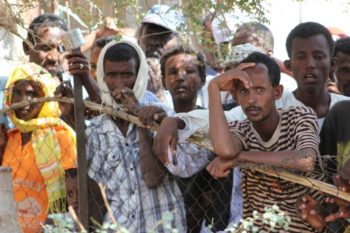
Israel on Monday announced it has scrapped a plan to deport African migrants to Africa and reached an agreement with the U.N. refugee agency to send more than 16,000 to Western countries instead.
Prime Minister, Benjamin Netanyah, named Canada, Italy and Germany as some of the nations that will take in the migrants – although not all appeared to have been informed of the plan yet.
Other migrants in Israel, many of whom are seeking asylum, will be allowed to remain in the country, which they entered illegally on foot through the border with Egypt, for at least the next five years.
The U.N. High Commissioner for Refugees (UNHCR) in a statement confirmed an agreement was signed with Israel, but did not name the countries that would accept the migrants.
A spokesman for the German Interior Ministry said he was unaware of any plans to resettle African migrants from Israel to Germany.
In Italy, a Foreign Ministry source said: “There is no agreement with Italy in the context of the bilateral agreement between Israel and the UNHCR.”
Canada has an arrangement with Israeli authorities to suspend the deportation of individuals who have private sponsorship applications with Canada until they are processed, said Hursh Jaswal, spokesman for the immigration minister.
There were 1,845 applications being processed at the end of last year, Jaswal said.
The fate of some 37,000 Africans in Israel has posed a moral dilemma for a state founded as a haven for Jews from persecution and a national home. The right-wing government has been under pressure from its nationalist voter base to expel the migrants.
The planned mass deportation led to legal challenges in Israel, drew criticism from the United Nations and rights groups and triggered an emotional public debate among Israelis.
In February, Israeli authorities started handing out notices to 20,000 male African migrants giving them two months to leave for a third country in Africa or risk being put in jail indefinitely.
Teklit Michael, who came to Israel from Eritrea a decade ago, said he was delighted by the new deal.
“I saw in the past few years a lot of people lose their hopes because of that deportation to an unsafe place,” said Michael, 29.
The Israeli government has offered migrants, most of them from Sudan and Eritrea, $3,500 and a plane ticket to what it says is a safe destination. At immigration hearings, migrants were told they could choose to go to Rwanda or Uganda.
But rights groups advocating on their behalf say that many fled abuse and war and that their expulsion, even to a different country in Africa, would endanger them further.
The groups had challenged the deportation plan in Israel’s High Court, which on March 15 issued a temporary order that froze its implementation.
Netanyahu said the UNHCR had agreed to organise and fund the new plan that would take five years to implement.
The UNHCR said it would “facilitate the departure to third countries to be determined of some 16,000 Eritreans and Sudanese under various programmes, including sponsorship, resettlement, family reunion and labour migration schemes, while others will be receiving a suitable legal status in Israel.”
“The joint commitment is that ‘You take out 16,250 and we will leave 16,250 as temporary residents’. That enables the departure of a very large number of people, 6,000 in the first 18 months,” Netanyahu said at a news conference in Jerusalem.
The U.N.’s refugee agency had urged Israel to reconsider its original plan, saying migrants who have relocated to sub-Saharan Africa in the past few years were unsafe and ended up on the perilous migrant trail to Europe, some suffering abuse, torture and even dying on the way.
“This agreement will ensure that protection is provided to those who need it,” said Volker Türk, UNHCR Assistant High Commissioner for Protection, who signed the agreement on behalf of the UNHCR.
The largest community of African migrants, about 15,000, lives in south Tel Aviv, in a poor neighbourhood where shops are dotted with signs in Tigrinya and other African languages and abandoned warehouses have been converted into churches for the largely Christian Eritreans.
Naftali Bennett, leader of the Israeli far-right party Jewish Home – a key member of Netanyahu’s coalition government – said on Twitter that the agreement would encourage more people to enter the country illegally, and he called on Netanyahu to overturn it.
Agency Report